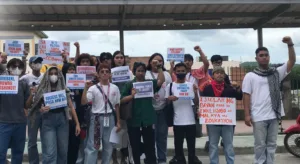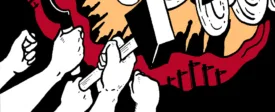By NDFP International Information Office
A total of 50 parties and organizations coming from 38 countries, including four ruling parties, yesterday demanded in a petition that the Council of the European Union remove the name of Philippine Prof. Jose Maria Sison from its list of "terrorist" persons, groups and entities… The signatories of the petition included representatives from the Communist Party of Cuba, the Workers Party of Korea and the Lao People’s Revolutionary Party and a member of the Vietnam Communist Party.
By NDFP International Information Office
A total of 50 parties and organizations coming from 38 countries, including four ruling parties, yesterday demanded in a petition that the Council of the European Union remove the name of Philippine Prof. Jose Maria Sison from its list of "terrorist" persons, groups and entities.
The signatories of the petition included representatives from the Communist Party of Cuba, the Workers Party of Korea and the Lao People’s Revolutionary Party and a member of the Vietnam Communist Party.
The petition said that the practice of “terrorist” listing unjustly and undemocratically criminalizes national liberation movements and revolutionary organizations and individuals. They said that the European Union is merely toeing the line of the United States in labeling as “terrorist” those individuals and movements that reject and resist the “new colonialism of corporate control and military might” of the US.
The petition was circulated for signing during the International Communist Seminar held in Brussels, 2-4 May 2005.
Around 50 parties and organizations signing the petition demanded that the European Union and its member states remove Prof. Sison and the Philippines’ New People’s Army (NPA) from the Council’s so-called terrorist list. They also demanded the full respect and protection of Sison’s rights as a political refugee and the refusal of any possible demand for his extradition.
They also expressed support for the peace negotiations between the Government of the Republic of the Philippines (GRP) and the National Democratic Front of the Philippines (NDFP) and called on the EU to encourage its resumption.
Informed of the statement of support, Prof. Jose Maria Sison said that, “I have high regards for the parties and organizations that issued the statement.”
“I am deeply pleased by their high sense of justice and international solidarity. Their support certainly carries great weight, especially because they include parties leading national governments,” Prof. Sison continued, referring to the ruling parties of Cuba, North Korea and Laos.
Prof. Sison has been living in the Netherlands since 1987 as a recognized political refugee. But in October 2002, the Council of the EU added his name to its ?terrorist? list. Without discussion or due process, his right to travel has been curtailed, his bank account frozen and his housing and health benefits stopped.
The parties and organizations that expressed support said they concur with the statements of other Filipino patriots who profess that Prof. Sison is not a terrorist, and that “all he does is fight with the poor for a life in dignity — that is a legitimate struggle.”
It is believed that the US and the EU are targeting Prof. Sison because of his life-long leadership role in the Philippine movement for national liberation and democracy. He was one of the pioneers who revived the anti-imperialist movement in the Philippines in the early 1960s before leading the re-establishment of the Communist Party of the Philippines (CPP) in 1969. From 1977 to 1986, he was the dictator Marcos’ most prominent political prisoner.













